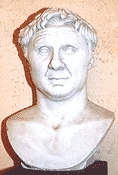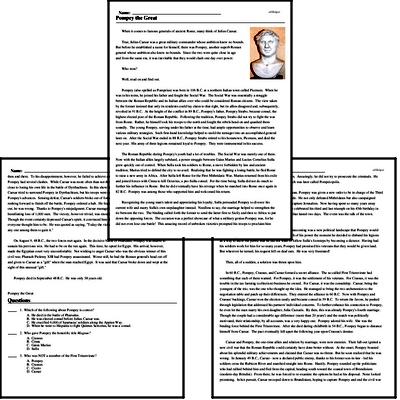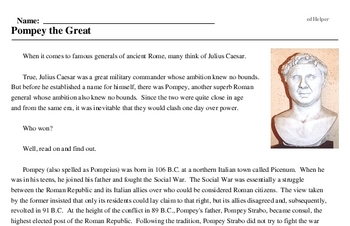Pompey the Great
When it comes to famous generals of ancient Rome, many think of Julius Caesar.
True, Julius Caesar was a great military commander whose ambition knew no bounds. But before he established a name for himself, there was Pompey, another superb Roman general whose ambition also knew no bounds. Since the two were quite close in age and from the same era, it was inevitable that they would clash one day over power.
Who won?
Well, read on and find out.
Pompey (also spelled as Pompeius) was born in 106 B.C. at a northern Italian town called Picenum. When he was in his teens, he joined his father and fought the Social War. The Social War was essentially a struggle between the Roman Republic and its Italian allies over who could be considered Roman citizens. The view taken by the former insisted that only its residents could lay claim to that right, but its allies disagreed and, subsequently, revolted in 91 B.C. At the height of the conflict in 89 B.C., Pompey's father, Pompey Strabo, became consul, the highest elected post of the Roman Republic. Following the tradition, Pompey Strabo did not try to fight the war from Rome. Rather, he himself took his troops to the north and fought the rebels head-on and quashed them soundly. The young Pompey, serving under his father at the time, had ample opportunities to observe and learn various military strategies. Such first-hand knowledge helped to mold the teenager into an accomplished general later on. After the Social War ended in 88 B.C., Pompey Strabo retired to his hometown, Picenum, and died the next year. His army of three legions remained loyal to Pompey. They were instrumental in his success.
The Roman Republic during Pompey's youth had a lot of troubles. The Social War was merely one of them. Now with the Italian allies largely subdued, a power struggle between Gaius Marius and Lucius Cornelius Sulla grew quickly out of control. When Sulla took his soldiers to Rome, a move forbidden by law and ancient tradition, Marius tried to defend the city to no avail. Realizing that he was fighting a losing battle, he fled Rome to raise a new army in Africa. After Sulla left Rome for the First Mithridatic War, Marius returned from his exile and joined forces with Cinna to kill Octavius, a pro-Sulla consul. For the time being, Sulla did not do much to further his influence in Rome. But he did eventually have his revenge when he marched into Rome once again in 82 B.C. Pompey was among those who supported him and welcomed his return.
Recognizing the young man's talent and appreciating his loyalty, Sulla persuaded Pompey to divorce his current wife and marry Sulla's own stepdaughter instead. Needless to say, the marriage helped to strengthen the tie between the two. The binding called forth the former to send the latter first to Sicily and then to Africa to put down the opposing forces. The occasion was a perfect showcase of what a military genius Pompey was, for he did not even lose one battle! This amazing record of unbroken victories prompted his troops to proclaim him Imperator, an honorific title for capable commanders. It also, however, earned him a rather unsavory nickname, adulescentulus carnifex ("teenage butcher").
After spending nearly two years at the frontline, Pompey finally eradicated all that remained of the Marian (pro-Marius) party in Africa by 81 B.C. At last, he could return to Rome. Upon his arrival, Sulla (now a dictator) bestowed upon him another honorific title, Magnus ("the Great"). Some said that this was meant to be a cruel joke. Had that been the case, it appeared that Pompey did not mind the mockery too much because he used the title extensively later in his life.




